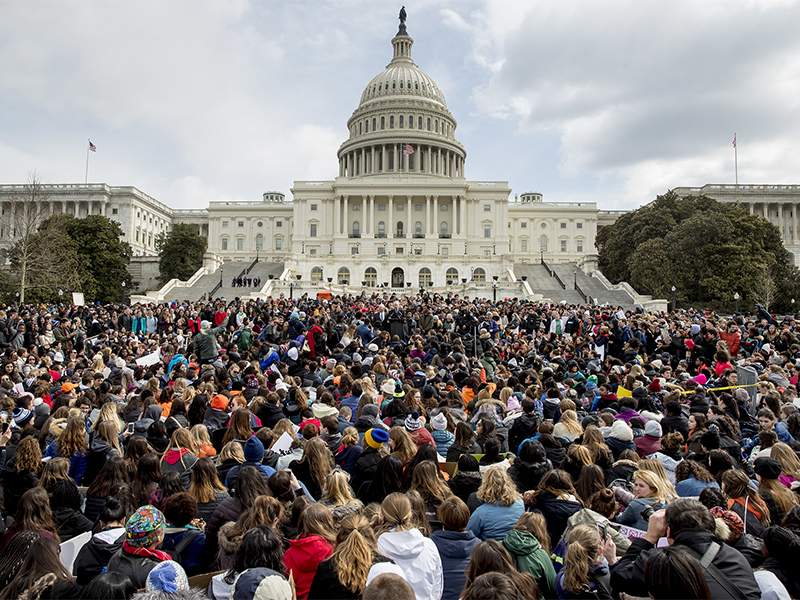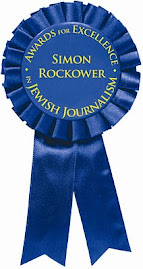(RNS) — I’ll be joining local teens on the March for Our Lives on Saturday (March 24), and by traveling, I will violate the Jewish Sabbath to get there. But in doing so, I’ll be fulfilling the greatest of Jewish religious duties — one that supersedes even the Sabbath itself.
Yes, this march is so important that I — a rabbi — am going to blatantly disrupt God’s holy Sabbath. But if the ancient rabbinic sages are to be believed, that’s precisely what God wants me to do.
The obligation to save lives overrules virtually all other Jewish laws, and this march, if successful, will surely save lives. I can think of no better way to dramatize both the historic magnitude and the religious significance of this march than to hop on the “Shab-bus.”
Countless lives are hanging in the balance right now. If this massive nationwide demonstration leads to real change, who knows how many lives will be spared the next time a deranged individual is denied that AR-15 because of strengthened, commonsense gun laws.
The last time I marched with the masses for stricter gun laws, in
downtown Hartford two months after Sandy Hook, the result was dramatic. Realizing that the National Rifle Association’s political clout was now being vigorously challenged by the popular will, the Connecticut state government proceeded to ban more than 150 assault-style gun models, along with magazines having a capacity greater than 10 rounds. The state also implemented a universal background check system and required a permit to buy guns and ammunition. As a result, gun homicides in my home state were cut in half.
That rally did not take place on Shabbat, so it was a no-brainer for me to go.
This one is different.

Students rally outside the Capitol in Washington on March 14, 2018. Students walked out of school to protest gun violence in the biggest demonstration yet of the student activism that has emerged in response to last month’s massacre of 17 people at Florida’s Marjory Stoneman Douglas High School. (AP Photo/Andrew Harnik)
The religious obligation in question is called Pikuach Nefesh in Hebrew, and is derived from Leviticus 18:5,
which states, “You shall keep My laws and rules, by the pursuit of which people shall live; I am the Lord.” Other biblical verses reinforce the message that laws are intended to sanctify and preserve life, not to cause undue risk of death.
Judaism has always promoted a culture of life (it bears noting that in Jewish sources, human life is defined as beginning at or about the time of birth). The Talmud states that to save a single life is equivalent to saving the world. The children at Sandy Hook and teens in Parkland, along with the slain of Las Vegas, Sutherland Springs, Orlando and so many other places, add up to tens of thousands of victims of gun violence per year — tens of thousands of worlds destroyed. These unbearable and intolerable losses have fueled my decision to become a one-time conscientious objector toward Sabbath rest. If so many victims are not resting in peace, how can I allow myself to rest at all?
Pikuach Nefesh can be applied in many situations, but most often it is discussed regarding Shabbat. In the second century BCE, Seleucid armies adopted the strategy of attacking Jewish renegades on Shabbat. The Jews offered little resistance and were slaughtered. In 1 Maccabees, the Hasmonean patriarch Mattathias rejected that blind piety, stating, “If anyone comes against us on the Sabbath day, we shall fight against him and not all die as our brothers did in their hiding places.”
The Talmudic sages taught that one who is vigilant in saving a life on Shabbat is praiseworthy. The Talmud presents several scenarios involving permissible Sabbath violations, including rescuing a child from a pit or saving someone drowning in the sea. The rabbis applied the principles of Pikuach Nefesh both to saving the lives of Jews and gentiles and made it clear that the risk of death did not need to be certain or immediate.
The most famous case in modern times — and the one most analogous to the march — occurred during a cholera epidemic in 1848, when the great Lithuanian Rabbi Israel Salanter stood before his community on Yom Kippur and encouraged them to end their fast prematurely. He dramatized that plea by eating and drinking in front of them.
In an account written eight decades later, Salanter is said to have stated, “There are times when one must turn aside from the Law, if by doing so a whole community may be saved. With the consent of the All-Present and with the consent of this congregation, we give leave to eat and drink on the Day of Atonement.”
Salanter’s advice did not directly save any lives, and in fact, contemporary opponents noted that many thousands of Jews in those same lands who disregarded his gesture survived. But it is conceivable that some who were in a weakened state would have become sick had they not cut short their fasts. The mere chance that his life-affirming act could have limited the spread of that deadly disease was sufficient to warrant his gesture.
My boarding that bus or riding in that car will likely not save any lives directly. But by linking the voices of Parkland to the Voice of Sinai, I can elevate the conversation on guns in our country, helping legislators and voters — and the teens themselves — to appreciate the urgency of now. Meanwhile, I’ll refrain from spending money or using my phone, and I’ll chant a psalm or two, and my rolling Sabbath may become — for me and the teens I join — the most meaningful Sabbath we’ve ever experienced.
At Selma, Rabbi Abraham Joshua Heschel, who marched alongside Martin Luther King Jr., remarked that he felt like he was praying with his feet. On March 24, I will be praying with my feet too. And while I walk, I’ll be praying that, in some small way, I’ll be saving lives, and thereby, just maybe, helping to save the world.
(Rabbi Joshua Hammerman is the spiritual leader of Temple Beth El in Stamford, Conn., and author of “thelordismyshepherd.com: Seeking God in Cyberspace.” The views expressed in this commentary do not necessarily reflect those of Religion News Service.)









No comments:
Post a Comment